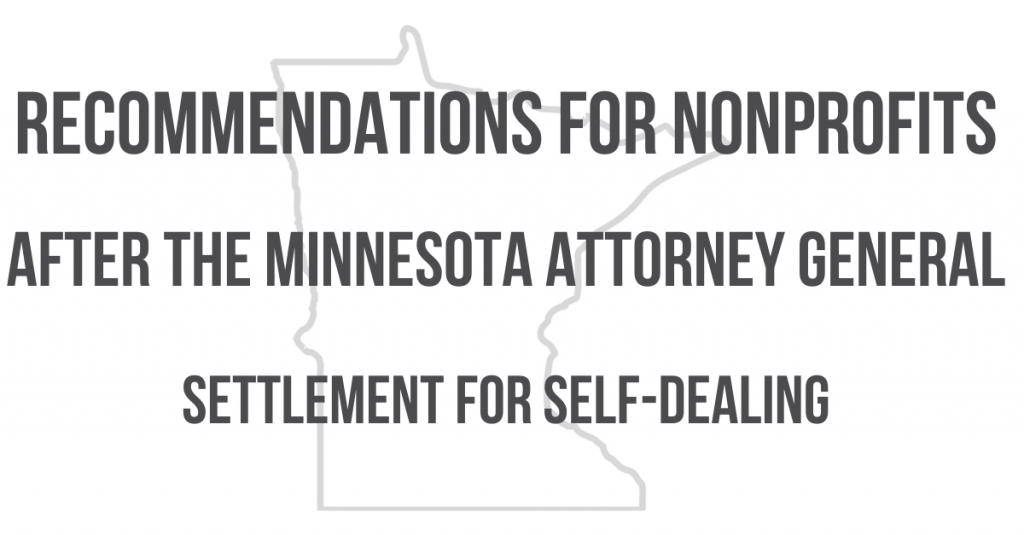
Posted September 15th, 2021 in Top Stories, Legal Insights with Tags Nonprofits
Recommendations for Nonprofits After the Minnesota Attorney General Settlement for Self-Dealing
A nonprofit recently settled with the Minnesota Attorney General due to conflicts of interest and allegations of self-dealing. While it may be easy to dismiss the settlement as an example of a sham nonprofit obviously intended to benefit the for-profit entities of its founder, there are valuable takeaways for many legitimate nonprofits.
When the nonprofit BFW Institute of Education & Research was founded in 1997, it was known as the Becker Furniture World Foundation, and its purpose was to provide furniture to low-income persons in need. The founder of the nonprofit was Douglas V. Huseby, also the founder of Becker Furniture World and its CEO. Sometime between 2010 and 2012, the nonprofit began to solicit grants for veterans to obtain treatment for chronic pain. However, the veterans could only use the grant funds, averaging about $5,000 each, at Ultimate Wellness Center (“UWC”) a for-profit business owned by Huseby with three locations in the Twin Cities. The nonprofit had no other charitable programming besides the veteran grant program for pain relief at UWC. Huseby continued to serve as the nonprofit’s Board Chair and President. The nonprofit’s board consisted of five directors: 1) Huseby; 2) UWC’s Marketing Coordinator; 3) UWC’s Chiropractor; 4) UWC’s Accountant; and 5) the only independent director with no financial ties to UWC or Huseby. None of the board directors disclosed their financial interest in UWC even though UWC was the exclusive provider for the veterans receiving the grants. In addition, although the nonprofit had a conflict-of-interest policy that required annual disclosure statements, only the independent director signed the annual conflict of interest statement and only once in 2019. The nonprofit was also in debt either to Huseby or his for-profit entities, although the board never reviewed or approved the loans. There were no formal contracts or agreements with UWC regarding what it would charge for the pain relief services to veterans on the grant program. The Minnesota Attorney General also used as evidence the information or omissions on the nonprofit’s required tax returns, IRS Forms 990, to demonstrate the nonprofit’s lack of compliance with the requirements for nonprofit governance and/or proof of the self-dealing transactions. Faced with the compelling evidence, the nonprofit agreed to numerous conditions, including removal of all four of the conflicted directors and other actions to correct governance issues.
From our advising experience, many nonprofits and boards lack training and knowledge about nonprofit governance on the same issues present in this settlement. Nonprofits also lack routine practices that ensure good governance. Bylaws and conflict of interest policies are not well followed; resulting in large gaps where documentation is lacking. Here, we present our takeaways for nonprofits from the BFW settlement.
RECOMMENDATIONS
- Review how your nonprofit recruits, invites, or selects board members and its impact to the culture of the nonprofit and board. It is fairly common for nonprofits to invite vendors, donors, well-connected community members to serve on the nonprofit’s board of directors. However, the nonprofit and the board should evaluate whether the individual’s addition to the board could cause the board or management to feel beholden to the individual’s company for services or goods, rather than objectively choosing the best provider for the nonprofit’s needs. For example, many nonprofits have currently made it a priority to recruit directors from individuals who use or live in the communities being served by the nonprofit.
- Implement a conflict-of-interest policy and provide training to your directors on what constitutes a conflict of interest. Build into your annual calendar of board meetings the opportunity to include the annual process for all directors to attest that they have read the policy, understand the policy, and understand their fiduciary duty to disclose any conflicts.
- Adopt a written policy requiring competitive arm’s length bidding for any services provided to the nonprofit or its grantees/members. Identify and retain appropriate service providers and subcontractors to further the nonprofit’s charitable purposes. Ensure that all services provided to the nonprofit or purchased by the nonprofit are memorialized in a written contract or agreement.
- Make sure that your accountants have nonprofit accounting expertise and that the nonprofit is represented by legal counsel with nonprofit governance experience. This was one of the conditions of the settlement agreement.
